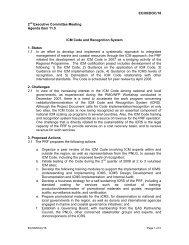Third East Asian Seas Youth Forum Toolkit - PEMSEA.org
Third East Asian Seas Youth Forum Toolkit - PEMSEA.org
Third East Asian Seas Youth Forum Toolkit - PEMSEA.org
Create successful ePaper yourself
Turn your PDF publications into a flip-book with our unique Google optimized e-Paper software.
<strong>Third</strong> <strong>East</strong> <strong>Asian</strong> <strong>Seas</strong> <strong>Youth</strong> <strong>Forum</strong><br />
Team Management<br />
DO<br />
By this point you have a vision, a plan and a way to promote your project. Now<br />
you need to turn that thinking and planning into reality.<br />
a. Valuing and caring for your team. Your team don’t stay involved because they love meeting deadlines or reporting. They stay involved because<br />
they feel that they’re making a difference, that they are valued and that they’re getting something out of their hard work.<br />
b. Understand the people on your team. It’s vital to understand the people in your team. Volunteers are far more than their job<br />
descriptions and outputs. Find out what motivates them, what gets them out of bed in the morning and what they want to achieve in the<br />
world. Spend some time getting to know your team as people – have them round for dinner, go out for a drink with them or relax at the end of a<br />
meeting.<br />
c. Creating a caring environment. It’s difficult to share with someone what makes you tick, so in order to care for your team, you need to create<br />
an environment in which caring is possible and appropriate. In order to do this you need to:<br />
• Create an atmosphere of trust<br />
• Make yourself approachable and trustworthy<br />
• Actively encourage people to share such information<br />
• Provide circumstances under which people can get to know each other outside of ‘work’<br />
• Remember the fundamental importance of confidentiality<br />
Time Management<br />
One of the biggest implementation challenges in any project is time management. Projects attract busy people so it’s essential to make the most of<br />
every minute. Here are some quick tips:<br />
• Avoid procrastinating – that is, doing anything but the task you need to. If something is both urgent and important to your mission,<br />
make sure you get it out of the way.<br />
• Create a to-do list. Once you’ve listed everything you need to do, immediately do all of those which take less than two<br />
minutes – to get them out of the way and clear your head. Prioritize everything else based on urgency and importance.<br />
• Delegation. If something is not very important to your mission or role, maybe you shouldn’t be doing it at all. It might be better to delegate it<br />
to someone else in your team.<br />
• Get in the mood. Different people work better in different spaces and environments. Think about times when you’ve been very productive and<br />
the space you were in – the music, the noise levels, the amount of light, the temperature and the people around you – and try and make your<br />
work space like that.<br />
• Have others hold you accountable. Often, we’re not very good at holding ourselves to account for our promises, and need others to do that for<br />
us. Make sure you let your team know by when you’ll be completing tasks so you also have deadlines. And<br />
remember, guilt isn’t very productive. If you can’t achieve a task with a certain date, it’s ok! It’s more important that you focus on the next task<br />
– guilt can just make you unhappy and even more unproductive.<br />
Project Sustainability<br />
If getting your project off the ground is hard – making it sustainable so that it can survive into the future is even harder. There is no sure pathway to<br />
sustainability but as a start…<br />
• Avoid taking on too much at the start because the more successful your project is, the more opportunities will emerge as you go. It’ll be key for<br />
you to learn to say no so you don’t burn yourself out.<br />
• Partnerships with other <strong>org</strong>anizations can be a great way to tap into resources and go further – especially if you have very similar objectives.<br />
• Try and create a model program that can be easily replicated – copied – by others without substantial involvement from you. An <strong>org</strong>anization<br />
that is built around a simple concept is much easier to sustain than one that goes from project to project – and the idea can even outlast the<br />
actual <strong>org</strong>anization.<br />
• If you can, avoid projects that require major ongoing costs. It’s unfortunately often harder to fundraise to keep something good going, than it is<br />
to start it in the first place.<br />
32



